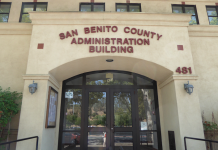
Every year, California’s legislators send a flurry of bills to the governor in hopes he or she will sign them. And that’s before the byzantine legislative process that leaves most proposed laws on Assembly and Senate cutting floors.
In 2023, the lawmakers sent off 1,046 bills, of which Gov. Gavin Newsom signed 890 into law.
Often, these affect everyday life, impacting such areas as criminal justice, food safety, traffic, education and civic life.
But occasionally, they do none of these. That’s the case with Assembly Bill 261, which establishes the golden chanterelle mushroom—Cantharellus californicus—as the state’s official mushroom.
The edible fungus is the largest chanterelle in the world, and prized by foragers.
In an online post, author Ash Kalra said the bill “seeks to enhance biodiversity education to better protect our fungi.”
This is actually pretty cool, and a refreshing change from the often tedious nature of lawmaking. Tongue-in-cheek jesting aside, many of the laws taking effect in 2024 are worth noting.
Minimum Wage
California’s minimum wage, already among the nation’s highest at $15.50 per hour, increased to $16 on Jan. 1. Beginning in April, the minimum wage will be $20 for fast food workers, thanks to Assembly Bill 1228 by Assemblyman Chris Holden. Gov. Gavin Newsom signed the bill in September.
On June 1, Senate Bill 525 will increase the minimum wage for healthcare workers.
Crime and Drugs
Assembly Bill 701 increases the punishments for fentanyl dealers, and sets harsher penalties for those caught with more than one kilogram of the drug.
Newsom also signed bills that require amusement parks and stadiums to carry overdose reversal drugs, and colleges to have fentanyl test strips on hand.
Healthcare
California already protects doctors from prosecution who provide abortions to women that come from other states.
Senate Bill 345, authored by Nancy Skinner, furthers that protection by shielding doctors who mail abortion pills to other states.
The law also bans authorities from cooperating with out-of-state investigations, and bars social media companies from complying with subpoenas.
Assembly Bill 616, by Lorena Gonzalez, raises the number of sick days to which employees are entitled from three to five, and prohibits employers from retaliating when workers take sick days.
Smoke Up—In Your Free Time
Californians legalized recreational marijuana in 2016, but the stigma surrounding its use remains. That includes from employers, who until now could consider cannabis use in employment consideration.
That is ameliorated somewhat by Assembly Bill 2188 and Senate Bill 700.
AB 2188 prohibits employers from using urine or hair follicle tests—which can detect traces of marijuana for weeks—from firing or punishing employees, and from using those results when making hiring decisions. Federal workers and those in the construction industry are excluded. Under AB 700, employers cannot ask about applicants’ past pot use.
Family Bereavement Leave
Senate Bill 848, by Susan Rubio, requires employers to provide five days of bereavement leave for a parent who suffers a “Reproductive loss event,” which can include a failed adoption, failed surrogacy, miscarriage or stillbirth.
For Rent
Under Assembly Bill 12, authored by Matt Haney, landlords can charge no more than one month’s rent for security deposits. Previously, new tenants could face up to three months’ rent for their security deposits.
Senate Bill 267 prohibits landlords from requiring credit reports as part of the rental process, and instead can ask for alternative means of proof of ability to pay.
Electricity Bills
Assembly Bill 205 mandates that electricity bills be based on income levels rather than usage. Under the law, low-income customers will save roughly $300 a year, while households earning more than $180,000 would pay around $500 more per year.
In the Shop
Assembly Bill 1084 requires retail stores with 500 or more employees statewide—and which sell children’s items—to have a gender-neutral section.
On the Road
Under Assembly Bill 256, police cannot use an expired registration tag as the sole reason for stopping a vehicle for two months after its expiration.
Assembly Bill 413, written by Alex Lee and sponsored by Streets For All, prohibits vehicles from being stopped or parked within 20 feet of a marked crosswalk or intersection. This pedestrian safety measure, known as “daylighting,” is believed to make all forms of transportation safer for everyone.
Assembly Bill 436 removes the authorization from local jurisdictions to enact cruising bans. Lowrider cruising is a culture unto itself, created after WWII by Mexican-Americans. Cruising bans, therefore, are believed to have primarily affected Latinos.
Law enforcement officials will no longer be able to begin with the question, “do you know why I pulled you over?” under Assembly Bill 2773.
Instead, they must state the reason for the stop.
Responding to rising instances of catalytic converter thefts, Assembly Bill 641 makes it a misdemeanor crime for unlicensed automobile dismantlers to possess nine or more that have been cut from vehicles. Repair shops and other legitimate businesses are exempt.
Senate Bill 55, meanwhile, makes it a misdemeanor to remove the serial number of a catalytic converter.
Assembly Bill 1125 repeals a court’s ability to take away a person’s driver’s license if they cannot pay court costs and fines. Authored by Gregg Hart, the law is intended to reduce the harm to low-income people who rely on their vehicles.








